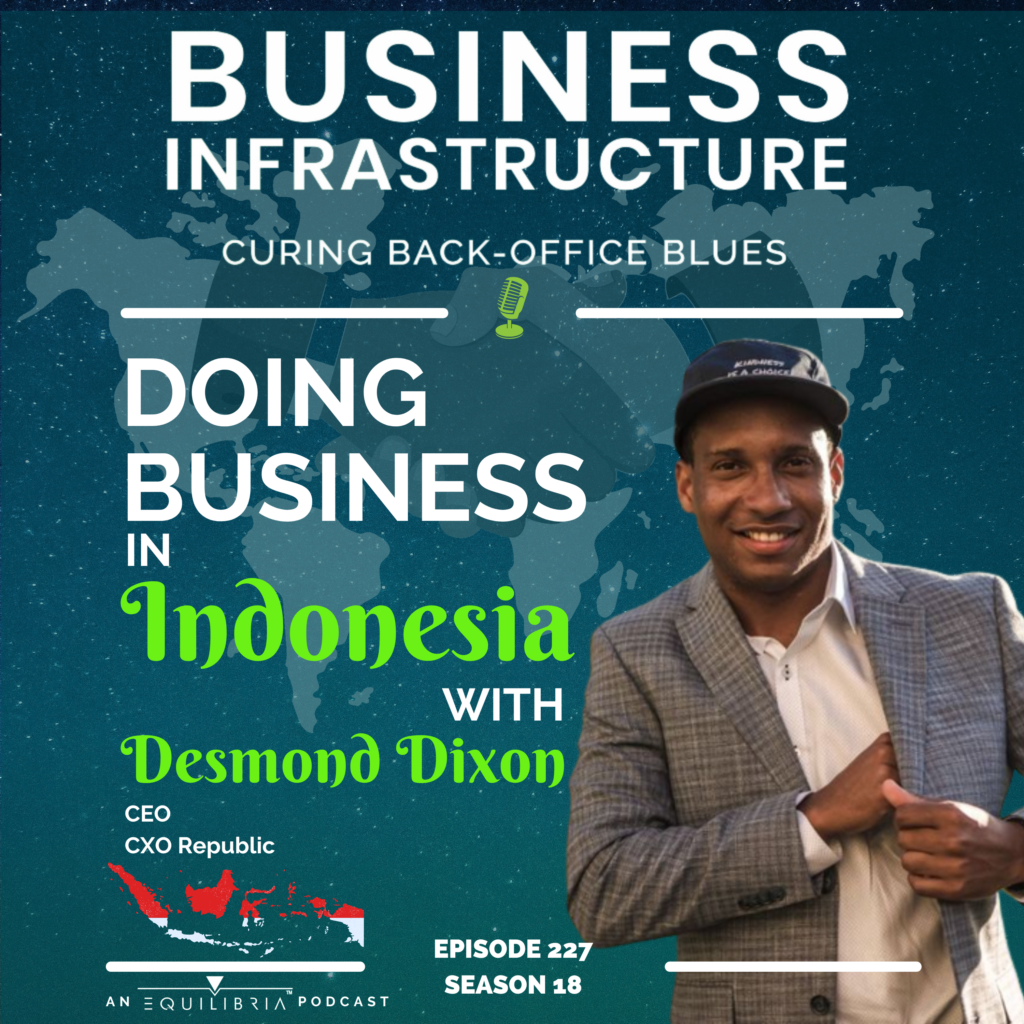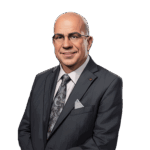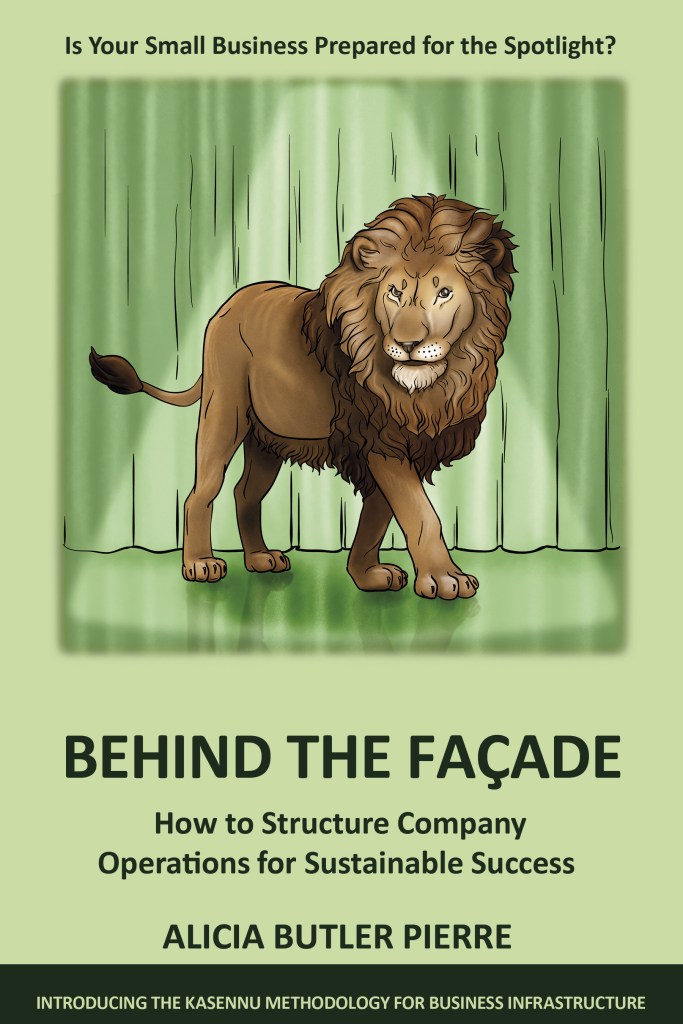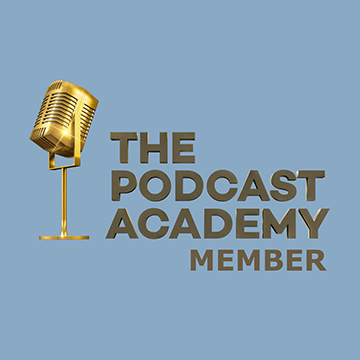Transcript
We have another long flight ahead of us as we travel further east from Rotterdam in the Netherlands to Bali, Indonesia. We’re looking forward to this. After spending so much time traversing Europe, we can’t wait to experience some tropical weather again!
I’m Alicia Butler Pierre and this is Season 18 of the Business Infrastructure podcast – the show where we share operational tips, tactics, and tools for curing back-office blues. Although the exhaustion of so much travel in such a short time is starting to wear on us, we can’t help planning all the fun things we’re going to do in Bali as we sit on Equilibria Airlines. We’re at the halfway point of our 12-country tour and this trip won’t be strictly business. We’re going to be here an entire week and we’re going to make good use of that time!

This episode is underwritten by Equilibria, Inc. the company behind this podcast where we design scale-ready business infrastructure for fast-growing small businesses.
As we descend into the Denpasar International Airport in Bali, we’re immediately struck by the sheer beauty of the landscape. All of the greenery, the crystal blue waters, the vibrant colors of both buildings and people’s clothes. No doubt this is a tropical paradise. I can see why our host, the million-dollar sales guy Mr. Desmond Dixon, says this is his favorite country. Before exiting the plane, I call Desmond on WhatsApp to let him know we’ve arrived. He’s ready to greet us and take us to a villa for our meeting. We’re now outside underneath a canopy, drinking fruit juices, wearing our hats and shades. It’s easy to understand how you could get used to living here. But what about working here?
This is Episode 227 – Doing Business in Indonesia with Desmond Dixon
My name is Desmond Dixon, and I’m originally from Dayton, Ohio, out in the Midwest. And now I am currently in Bali, Indonesia.
I joke with Desmond every time I communicate with him because he literally seems to be in a different country each time. Here’s something you need to know – Desmond is also a digital nomad. So far, we’ve heard from other digital nomads this season, none of whom are American. So, let’s start there, how did Desmond become an official digital nomad?
Wow, that’s a really, really good question. well, I would have to say when I went to the Ukraine for a business trip to work with a client for a few months, they set me up with different apartments and things while I was there. And I just got a taste of working in a different country. It was just like normal life. And so, I got my first taste of remote work.
While working in Ukraine, Desmond still had an apartment back in downtown San Diego, CA – an apartment that cost him $5,000 a month. So, when he returned back to the U.S…
I just had this itch to like, go back, not specifically to Ukraine, but I just wanted to see more things because I got so used to working overseas. So, I essentially did the brave thing first. I started watching YouTube videos to figure it out and trying to figure out where I want to go, because when you expat or you leave the country, you have the entire world as your oyster, right? Everywhere I was looking was pretty much cheaper than living in California. So, I didn’t have to think about budget, I just had to pick the list of places I want to go.
Before we get into the details of how Desmond began jet setting around the world, let’s explore his background. How did a kid from Dayton, OH end up in San Diego, CA in the first place?
Yeah. So, I was really big in math and science growing up. I came from the hood, so to speak, and humble beginnings. I was really good at doing science fair. And I ended up going to Turkey, which was my first international experience. And I was getting recruited for Miami University to do accounting and finance with the Ernst & Young program. And I got enrolled by amazing man named John Kerr, who, pretty much recruited me into the chemical engineering department. And so, I was really fortunate to work on a lot of cool stuff there. I did some, actual, NASA, rocket science type of projects which was these just amazing programs to send experiments up to, you know, not all the way into space, but technically space, right?
So, I like to keep that badge of honor, and I’d worked in a private industry, and I realized after doing my second internship, that this wasn’t for me, and that I was curious about what other options I had.
This is why I consider Desmond a kindred spirit. We both have degrees in chemical engineering, and it didn’t take each of us long to figure out we didn’t want to work in the traditional manufacturing industry for the rest of our careers. He realized something bigger was calling. Opportunity didn’t knock on his door; instead, he knocked on opportunity’s door, and…
And so, I had decided to turn down, a very lucrative internship for another summer in Seattle to go knock on doors to some friends in Dallas, Texas, in the heat. And at the time, I knew nothing about sales. I knew nothing about converting or persuading, I had this big gap. So, I ended up knocking, going over a thousand doors, got a thousand doors slammed under my face, got fired halfway through the summer. And I knew in that moment as I’m sitting at my uncle’s house in Texas that I never met before because I got kicked outta the corporate housing that I wanted to do sales.
It’s worth mentioning that during Desmond’s transition from engineering to sales, he did have a five-year stint working in different manufacturing plants. After doing what he calls his “victory lap,” he actively pursued a new career in sales – one that was still at the time an enigma to him. So, what made him venture into the unknown when others would have stayed in the comfort of the known?
Intrinsically, I just watching my manager at the time who was doing this door-to-door, like shadowing him and watching him close these deals with strangers, back-to-back, sitting at their kitchen table with me there, at the kitchen table with them as they were like talking through contracts and signing contracts of $7,500. I’m like, “You just met this guy two hours ago!” I was so fascinated, like, being an engineer, you’re always, like, your problem started, well, what was the hypothesis of this? Was this like voodoo? Like, what just happened?
It wasn’t voodoo or magic, but it was intriguing. Intriguing enough to make Desmond want to learn more. He couldn’t shake the feeling that he had to get in on this sales thing.
I just had this, like, I was like, Yo, I’m missing out on something! That curiosity really just drove me because it’s like, man, watch this connection and this trust and this like, exchange of value between these two people really lit a fire underneath my butt. And then knowing that, and I hate to say it like this, but I had a chemical engineering degree. I knew I had that in my back pocket, so allowed me to be super aggressive and super brave in going all in, knowing that what’s the worst that can happen I get fired again and I’m stuck at my uncle’s house with no money, and I’m like, down and out? I’ll just go call John Kerr, who helped me become chemical engineer and say, “Yo, I need a job, man,” and he’ll plug me into someone in this network. I had that in my back pocket, fortunately, which allowed me to take risks and, really just go all in on it and burn the boat, so to speak.
And burn the boat Desmond did indeed. By giving up the safety net of a career in chemical engineering, he took a page out of Cheryl Sandberg’s book and literally leaned in – all the way in. This brings us back to him being in San Diego with that high dollar apartment. How did the opportunity to work in Ukraine come about?
Once again, it’s crazy how life works. I feel like the luckiest guy in the world my first business at the time, was during the pandemic doing holistic wellness at corporations and co-working places, like in events. That shut down overnight due to the pandemic, there was no more in person chiropractors, you know, acupuncture, no more meditations, no more massages. Everyone has cooties, get away.
With a business on hold indefinitely, Desmond started networking to figure out his next move.
And people started to introduce me to people. And next thing you know, I got introduced to the high-ticket sales game. Because my business was shut down. I was kind of getting to a little depression with the pandemic and I was like, I need to find something else to do. And I got introduced this guy named Sam Cook. and he had an agency called James Media Cook and a startup called Sanity
Desk.
So, I got brought in with them and I started to sell off like day one, I started to sell a bunch of stuff and they was like, “Okay, we’ll scale this thing.” So then started to scale the companies. And I was like, Okay, great. Let me bring in the sales team. I called one my buddies. I was like, “Yo, man we need another salesperson.” He’s in Las Vegas at the time. I was like, “Bro, get to my house. Be here
tomorrow! We’re flying to Ukraine.” He was like, “What?” And I’m like, “Yo, like, come to my house right now, like, we’re gonna fly to Ukraine.”
So, his buddy drove over 300 miles from Las Vegas, NV to San Diego, CA and they headed off to Ukraine. They landed ready to put business infrastructure in place by building a team to scale operational capacity. Business infrastructure is a system for linking people, processes, and tools to make that type of scale possible.
We’re scaling a startup, we’re scaling the agency, selling a bunch of stuff, and then building the team at the same time, right? So, like recruiting and doing all these different things. Before I was supposed to fly back to America, I caught Covid like two days before my flight and I got stuck cause I was in this country that’s technically at war.
And I’m like, oh man, I did not think this through. I was young and dumb. I’m about to die by myself in Ukraine, in the room. My family’s so far away, right? But I had actually my best sales week that week, ironically, ’cause I guess I was YOLOing, right?
YOLO – You Only Live Once…but Desmond’s young enough to go through an experience like being stuck in a war-torn country with covid and quickly bouncing back. He credits this experience with two things.
One, it opened up my understanding and my moat in high ticket sales. And it also gave me a touch of being abroad. And it’s amazing how I’m doing it to this day, but at scale through other people.
I wanted to know more about being tasked with scaling Sanity Desk. I doubted that the CEO just flew Desmond and his friend to Ukraine without some planning and preparation.
He enrolled us. He was like, “Hey man, you guys should come out to the Ukraine, we’ll fly you out, okay? And like, put you up and all this stuff.” And I was like, “Sure.” So, I got enrolled because we were crushing it. He wanted to scale and it’s easier to scale when everyone’s in person, you have that energy and it’s hard to do when everyone’s in different time zones.
And so, when you, when you say scale, what exactly did it look like was it, in terms of revenue only, was it, in terms of building the team? What exactly did the scale look like and how long did it take to accomplish that, given that it was during Covid?
It was a little bit of both. First it started off with revenue. Cause obviously you wanna max out the revenue you can per employee, then you obviously add more employees based upon what’s needed with the goals. we were actually doing paid traffic. So, as we close more and more deals, a lot of the money was put right back into ads to increase the deal flow. As the deal flow increases, you gotta
have the right people in place to make sure there’s no leaky buckets to make sure that, you know, we could run the, the funnel to the maximum of the ability. We’re doing a lot of testing. I can remember like a lot of my job was the sales strategy conversions. Converting at a higher level, converting faster.
Because cashflow becomes a game, if you, waiting three months to close the deal in three weeks is a huge difference in cash position. And obviously a huge difference on how much money is then reallocated into the ad budget. So, speed to close is really important. I was out there coming up with different strategies to sell faster essentially into more people. And then at the same time building out the right sales support structures, I did a lot of training with, a lot of the Ukrainian team who was on the support staff booking calls and following up with leads because as closers, we’re taking like five to eight calls a day, doing our own follow up. So, and at the same time we’re getting like 20, 30, 40 leads a day each.
So, we needed the right support system so that we didn’t break the funnel or hit plateaus. we were scaling pretty good. It was a really good experience building essentially, an eight-to-nine-person team with a lot more setters, we use some arbitrage with, low costs, you could pay people at different prices abroad compared to the United States. That’s pretty much high level of what we did to this.
After recovering from covid, it was time for Desmond to go back home to San Diego.
When I got back, the process pretty much started for me to transition. I actually went from running the sales team and being head of sales, for both companies to, a consulting role, my friend who I brought from Las Vegas actually became head of sales and he transitioned that role and I essentially recruited for them, helped hire, did some training for the team, and I still closed some high level deals like, 25K here, 100K there, like really, really high ticket deals, for the agency. When I transitioned, I talked to the CEO and I was like, “Hey man, like I am pretty much ready to go on my own now.”
And so, he was like, “Cool, let’s, bring you on as a consultant, so you can still add some value and work with the team and help us recruit talent.” So, I ended up doing that. They were my first client that pretty much helped me really establish the skills that I have today. And then I just started to get more clients.
And word spread quickly about Desmond being out on his own. Soon, he found himself landing another client while attending a wedding in Hawaii. This gave way to his official life as a digital nomad entrepreneur. Coming up after the break Desmond shares more behind-the-scenes details of how he built his new sales recruiting firm and resources he uses to seamlessly relocate from one country to another all while making great money and living life as “the luckiest man in the world.”
Do you need to grow your team but aren’t sure where to start let alone who to hire first? Well, it’s clear you can work with someone like Desmond Dixon to jumpstart your efforts. But as Desmond helps you recruit those salespeople; will they know how to do their work? Do you have any of your processes documented?

If you own a fast-growing small business and want a company that can consistently operate without your daily presence, then the Smooth Operator course is for you. It’s an online introductory course on business infrastructure that can provide you with proven tools, tactics, and techniques to calm the chaos and restore order. Go to SmoothOperator.courses to learn more. That’s SmoothOperator.courses.
We’re back. And our latest venture has us in Bali, Indonesia on a villa talking to the one and only Desmond Dixon. He was just starting to tell the story of how he began building his sales company, CXO Republic. Here’s Desmond.
I didn’t pay for any marketing, anything like that, and I just started to sign more consulting clients. I was doing some recruiting deals, so, I tried a lot of different business models; consulting takes a lot of my time. I did some recruiting, and then I found this gap where a lot of entrepreneurs are reaching out to me who wanted to get salespeople, like closers and setters. They didn’t have the right processes; they didn’t have SOPs in place. That was strike number one that really hurt. And the strike number two was they were not really good managers. They’re trying to remove themselves from the sales process, and then finding themselves managing a salesperson. And that salesperson obviously needs a ramp up period. So, you’re not getting the maximum output right away from that person.
Recognizing this gap in the market led to Desmond exploring recruiting as a viable business model.
There’s a lot of competitors out there that recruit and just take money up front and, leave the entrepreneurs out to dry. My ethos, coming up in sales was always treat the customer right, how can I make this a no brainer win? I’m gonna do my fractional sales leadership, like what I did at Sanity Desk and have recruiting a part of that, and I can actually manage those people so I can protect my reputation with the closer community and setter community.
Because a lot of the talent I was getting was from referrals because I helped them get really good jobs so they’re telling their friends, it was like my deal flow. I needed to protect my reputation on the supply side. I wrote out this offer under, CXO Republic, but it’s the holding company. Now I have remotesalesmanager.io and we’re closing at a 60% rate right now because it’s just the way I have it set up. And the numbers make it so that I can hire, some other fractional sales leaders to unlock some capacity because right now I’m fully booked, which is a blessing. I’m super grateful for that. But it’s pretty interesting. So, I try a lot of different offers throughout the year testing out what works, what doesn’t. I’m still did six figures this year, I found my sauce this year, so I’m super grateful for that.
As Desmond’s building his business and testing different business models, he’s also actively engaged in his digital nomad lifestyle. How does one move about so effortlessly, especially when operating a business?
I’m a minimalist, so like I have all my clothes, I got my watches. I got all the expensive stuff I just love; I left the wood and the metal at home. I left it in the storage. I still pay the storage, but I got my Bitcoin. That’s all that matters.
Okay, so that makes sense. Desmond’s only keeping the essentials with him. And just to give you an idea of how much he’s moved around in just a two-year span, check this out.
I went to Mexico for, a week, just hang out at a resort and then went to Greece, which was awesome, with a beautiful town Arrhythmia, on the island of Crete, highly recommended. and then after that, was Montenegro, which is my second favorite country in the world behind Indonesia. It’s a hidden gem. It’s, it’s amazing. Qatar and Budva definitely going back, to the Balkans next spring, Croatia. Then I did some fast, started at Croatia, hit Egypt. I hit Istanbul, took, you know, Cappadocia and went to Italy. So, I got to go to the Mafi coast and hang out there and live down there for a couple weeks. And then Sicily and, after Italy, I then came here to Bali. Now I’ve been here for about three to four months.
And now that he’s “danced” around the globe as he describes it, in true engineering fashion, Desmond’s figured out a formula for his living arrangements moving forward.
I’m gonna spend six months, in Southeast Asia, split between B and maybe, I don’t know, Thailand or Vietnam, depending on which one I like more. And then six months in Europe, spring, summer. And you said your friend has to come back 30 days. I’m trying to avoid coming back to United States because I know that if I’m out of the country for more than 330 days, I get like a tax.
My friend that Desmond is referring to is Tiffany Smith, who you’ll hear from later this season when we go to the Middle East. In order to not lose her U.S. citizenship, she must return to the U.S. for at least 30 days every calendar year. But Desmond’s clear that he will not return to live in the U.S. unless the price is right. But let’s get back to how he built his remote team for CXO Republic.
First, I gotta speak about some mistakes to learn from.
I think that’s the most valuable, I would say only hire remotely, when it’s directly co-related to some type of revenue growth that you can literally, be very clear of. And the reason why I say that is because sometimes when you’re trying to scale, you think that you might need someone when you probably don’t, thinking creatively about how can I get more out of the same people? It’s pretty important because early on I over hired, when you have a bunch of money in the bank account and you’re like, Well I need to spend this ’cause I need to grow. Like, you just look for ways to spend money, right?
That was my first mistake. And now I’m pretty lean, I have more contractors than people who work full time for me. And so, me making that pivot Q2, now I am in a spot where it’s like I get to enjoy 80, 90% margins because I pay people based upon performance, I have partners, I have recruiters that work for me. I did have an assistant at first, but me having an assistant put me too out of touch with sales and out of that human-to-human aspect.
I don’t even know if I ever will get another assistant to be honest, I’m just so close to my network and so tapped into sales that it’s hard for me to give that responsibility to someone else again. So, I work with more contractors now, that it’s easily for me to cut the relationship really quickly. Even in my clients and all my contracts, I can fire them to give me that flexibility because once again, this is a lifestyle business for me. Cause I’m enjoying my time traveling. I’m only spending a couple grand a month. So, it’s pretty easy. I’ve placed like 40 salespeople.
So, Desmond’s described the people element of business infrastructure. What about the process element?
I have my own test of how to recruit. I first look for attention to details. I will bury an Easter egg to make sure they read the whole job description because that’s like easy way to filter out people. Like if you can’t read the whole entire job description and you’re applying for a job, then you’re obviously not the right person.
Cause you need to be detail oriented to be a salesperson, in my opinion. After I do that, then I move into like unorthodox stuff. Send me a 60-second video cause I wanna see how confident they are. I wanna see how well they, communicate and all that. So, I have ’em send a 60-second video and then I ignore them because I want someone who follows up. I’m being serious, this is my sales process. I’m giving people the game, how hungry are you? Are you dating like 25 people right now trying to get a job or are you like, really wanna work with me? I’ll wait for them to reply and then that’s the test number three.
Okay, this is interesting, but there’s more…
And once they do that, then I jump on an interview, which has an application associated with it and they fill out the DiSC assessment and then, based upon how that call goes, either place with some clients, send ’em to some different partners or sometimes I mentor. So, every month I’ll mentor one or two people for free and just teach them personally one on one. and then get them a job. So that’s kind of how I recruit people to build other people’s teams and I learned to keep my team pretty light and flexible. So, I don’t find myself in a really bad position just ’cause you never know what happens with the economy.
I know we have to start wrapping up here, but oh gosh, there’s so many more questions for you Desmond, but I do wanna ask this one. Where exactly on paper is your company located? Is it still considered a US based company? Yes. I am definitely registered in the United States.
Okay. Got it. And so, with that in mind, how does pricing work? Is your pricing model still based on US dollars?
This is a really good question. I’m in the middle of closing a deal with someone in South Africa right now. And we had this discussion today about the South African Rand and US dollar. I price everything in USD, and I have different, ways to accept payments. Stripe is my primary. I think they accept any currency but then also have Wise. So, to accept euros and the British pound also accept Bitcoin. I have my Bitcoin address ’cause I like paid in Bitcoin as well. and ACH. all my clients pay with Stripe cuz it’s on reoccurring payment. The worst thing as an entrepreneur you wanna do is chase down and already booked business. To get invoices paid. So, I like reoccurring revenue and I’d rather pay the 2.9% processing fee to have that on lock, it just comes in my bank account. I think you can accept any payment through any currency through Stripe.
With all this talk about Desmond’s career journey, being a digital nomad, and building business infrastructure with 100% remote operations, I almost forgot to ask him, what is Bali like? What’s it like to do business there?
So, this place is freaking amazing. It’s literally covered with entrepreneurs, creators, investors, and I think that’s very important. Cause as you leave the country, United States community can be really, hard to establish you know, connections and availability to people. And so, the people here are amazing, and it’s a very coveted location. The lifestyle here is untouched by I think anywhere in the world. And because you can have an amazing villa, you know, get massages every day, go to an awesome gym, eat super healthy food, and go to the beach, you know, rent houses on the beach or in these different destinations and still spend under like three or $4,000, right? Like, it’s so crazy how far your money goes for the amount of value that you get.
And some of the people I met here are probably gonna either like, do business with them at some point, I’m gonna pass business their way or who knows, you might become a client, but it’s so easy to network here because everyone’s here on the same wavelength. They left their home country; they’re usually doing something online or they have a business and they’re open minded. They’re open to connect, they’re open to collaborate, they’re open to do business. I already started looking into like a kit visa, I’m considering buying land here, or leasing it technically by the government, and possibly building a villa in the future. I mean, I love it that much.
I couldn’t help but wonder about Desmond’s living arrangements as a digital nomad. Does he couch surfing, doing the Airbnb thing, or arranging for short-term house rentals? I value location more than anything. And obviously space is important. In Bali right now I’m staying actually on a resort-like complex I have my own little apartment here and this complex has this super sauna complex and ice baths and a world class gym and a co-working space and like seven restaurants and pools everywhere. So, it’s like this little bubble-like luxury resort up here in Ubud. So, for me, the convenience factor was worth it. And then on the weekends I go rent at Airbnb’s, at villas and, you know, by the beach. So, I live in the jungles at this luxury resort where I can focus on the business, during the week, at least Tuesday, Wednesday, Thursdays are my deep workday. So, I’m working 12 to 16 hours calls, all that kind of stuff. And then on the weekends I go escape and do creative work, chill on the beach, you know.
I’m thinking about that $5,000 a month Desmond was spending on rent in San Diego. I can see why he’s smitten with how far his money stretches living abroad. As our time together comes to an end, I asked if he wouldn’t mind telling us more about his podcast as well as resources, he recommends for doing business in Bali.
Campfire Capitalism is my pod that actually started while I was doing my journey around the world. And I interviewed amazing entrepreneurs and investors and allow them to share some their zone genius with the audience and their story about how they created an awesome, successful life. And right now, I’m running remotesalesmanager.io where I build, train, and source sales teams for online businesses and tech companies. And for the book recommendation, you’re gonna love this one. My favorite book of this year so far is The Phoenix Project. Really just opened up my mind about workstations and flow through within the business. And for travel. Lost LeBlanc on YouTube has probably the best travel content, cause it’s kind of entertaining, but it’s also really informational and sparks more curiosity on specific things that you might be interested in.
BaliBible.com in general has a bunch of really cool information about Bali and pretty much everything in terms of like the business side of stuff, getting a visa, gala visas and I’ll send you that link as well, so you have it. Because if you’re a tourist like me, technically traveling the world, my stuff is still based in the United States because I obviously want US banking, I want US dollars I’m not in a big rush to open up foreign banks and if I did open up a foreign bank account, I probably will only open up something in the Euro or the pound.
Well Desmond, my friend, I am in awe of you and the life you’ve created for yourself. I really appreciate you spending time with us.
Aw, thanks for having me. Too much fun!
Alright. Wow! What do you think? Is the digital nomad lifestyle for you? Is it possible for you to also build a 100% remote team? It’s something for us to think about as we ride our bicycles back to the resort where we’re going to stay for the next week. In case you’re wondering about those resources that Desmond shared, you can find all of them at BusinessInfrastructure.TV.
When we arrive at the resort, we start comparing notes about everything we’ve learned so far this season. This type of reflection is good because it helps us think of questions to ask during the next leg of our journey. And where will that be? Come on now, you know you’ll have to come back for the next episode to find out!

Thank you for tuning in! If you enjoyed this episode, then please subscribe and leave a five-star Smoother rating and review.
Being a full-time digital nomad running a 100% remote business with fully digitized operations may not be possible for you, but there are some valuable lessons to learn from Desmond. His mind is sharp, so make sure you connect with him for a brainstorming session if nothing else. It’ll be well worth your time! Remember, we’re all here for you so stay focused and be encouraged. This entrepreneurial journey is a marathon and not a sprint.
This podcast was written, produced, and narrated by me, Alicia Butler Pierre. Audio editing by Olanrewaju Adeyemo. Original score and sound design by Sabor! Music Enterprises.
This is the Business Infrastructure – Curing Back-Office Blues podcast.












